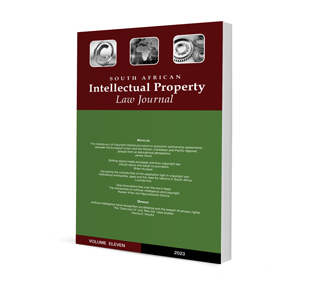
Shifting digital media ecologies and how copyright law should adjust and adapt to journalism
Author Brian Hungwe
ISSN: 2521-2591
Affiliations: PhD Candidate, School of Law, University of Witwatersrand
Source: South African Intellectual Property Law Journal, 2023, p. 16 – 41
https://doi.org/10.47348/SAIPL/v11/a2
Abstract
Digital Age misappropriation and plagiarism of published online news content by some South African media proprietors are negatively affecting professionalism and integrity in journalism. Such infringements invariably lead to great tension, harmful competition patterns and dwindling revenues. Frequently, digital news misappropriation creates factual distortions, impairing the democratic functions of journalism and healthy national discourse motivated by legitimate public interest considerations. A 2019 Reuters Institute Digital News Report revealed that, globally, South Africans spend the greatest number of hours browsing online, with 36% of the population enjoying sharing news content, while 40% enjoy commenting on news via social media or news websites. While the Digital Age has generated many forms of active players in journalism, this paper is limited to digital infringement conflicts and contestations between accountable and established media proprietors or competitors. This qualitative contribution proposes that media proprietors collectively seek an alternative dispute resolution approach to copyright infringements through a comprehensive ‘Media Arbitration Copyright Infringements Code’ with incorporated ‘Hot News Misappropriation Doctrine’ provisions to regulate the conduct of the media and to address proliferating digital infringements. The Media Code should also guide the proposed ‘Media Copyright Tribunal’ operating within a commercial arbitration framework in dispute adjudication and resolution. This paper argues that the Media Code with the Misappropriation Doctrine is a more viable approach for addressing media copyright disputes because it largely protects facts contained in published news content. Furthermore, a Media Code that is drafted addressing media copyright digital infractions using the ethical benchmarks set by the ‘Press Code of Ethics and Conduct for South African Print and Online Media’ editorial guidelines interpreted through a flexible informal commercial arbitration framework that expedites dispute resolution is desirable. This paper is largely concerned with the court’s findings in Moneyweb (Pty) Limited v Media 4 Limited and Another, and the fact that it took about three years for the dispute to be resolved. Moreover, this paper argues that the current Copyright Act 98 of 1978 is less effective in dealing with the ethical quandary faced by journalism in the Digital Age.